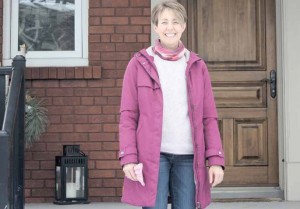THERESA WALLACE
Sometimes one moment is branded on the heart. The phone call with your mother when she forgot you have three children. That first time your father went for a walk and got lost. The day your spouse drove home an expensive new truck that was far beyond your budget, and you had to return it, embarrassment overshadowed by the painful knowledge that your lifelong partner was disappearing.
For Lynda Colley, this moment of reckoning for her family—which, in truth, can be one of many such moments as a loved one declines—came during a home visit by a worker from the local public health authority. “My sister was with Mom when the assessor asked Mom questions to determine what her needs were, including a question about who was sitting beside her. Mom turned to my sister, paused and eventually said, ‘Oh, this is my friend.’ A heartbreaking response for my sister, for all of us.”

Lynda Colley, pictured here on her front steps in Old Ottawa East, has volunteered with The Dementia Society of Ottawa and Renfrew County since 2008, and has chaired the organization’s Board of Directors for the past four years. Photo by Theresa Wallace
Colley, a litigation lawyer who worked in private practice for a number of years in Toronto, then in Ottawa for Fraser and Beatty (now Dentons) before joining the federal public service, had two very young children and was working full-time when her mother was diagnosed in 2000. She says her sister and father took on most of the burden of care during the 10 years her mother lived after her diagnosis. The family also received much-needed guidance and support from the Dementia Society of Ottawa and Renfrew County.
In 2008, Colley started volunteering with the dementia society. She’s been on the board for close to six years and chair for almost four, but emphasizes she’s just one of many supporters and the rewards she gets from helping out— meeting new people and learning new things—vastly outweigh the hours she puts in. The Dementia Society of Ottawa and Renfrew County serves more than 5500 people per year and relies on hundreds of donors and volunteers as well as funding from the provincial government through the Ministry of Health.
“Our core services are provided through our dementia care coaches, who are experts in dementia care and support,” Colley explains. “They provide one-on-one counselling, lead support groups for caregivers and people suffering from dementia, and give guidance to people who aren’t sure what services are available or where to turn.”
The dementia society also offers recreational programs. There’s a pedal power program, one of the society’s most popular, that allows clients to cycle at home, as well as instructor-led art, music and dance programs. Like so many organizations, the society has moved all its programming online and introduced new programs due to COVID-19. Colley notes the pandemic has been difficult for those suffering from dementia and for their caregivers. “Isolation can worsen dementia and people’s ability to deal with it because it can remove social contact, upset routine, and stretch the reserves of caregivers to the limit.”
The dementia statistics are daunting (see sidebar) but Colley says research shows even small lifestyle changes can help improve brain resilience and reduce the risk of dementia. “What is good for your body is good for your brain and it’s never too early or too late to take action to prevent dementia.” Colley, who lives on Merritt Avenue across the street from a teammate on her women’s ultimate frisbee squad, obviously takes her own advice because she’s often seen in the neighbourhood heading out for a walk, a hike, a bike ride, a ski, or a skate on the canal.
If you worry that you or someone close to you is experiencing memory troubles, or if a family member has recently received a diagnosis, Colley encourages you to contact the dementia society. You don’t need a referral or a diagnosis of dementia, and during the pandemic all programs and services are free. For more information, please consult the website dementiahelp.ca, phone 613-523-4004 or email info@dsorc.org.
What is dementia?
Dementia is an umbrella term used to describe a group of symptoms that occur when brain cells stop functioning properly. The symptoms of dementia vary but usually involve changes in cognition (memory, thinking, language), in behaviour, and in physical functioning such as movement, vision, coordination, and balance. The five most common types of dementia are Alzheimer’s disease, vascular dementia, dementia with Lewy bodies, frontotemporal dementia and mixed dementia.
• Every hour in Canada, nine people are diagnosed.
• Approximately 420,000 Canadians over the age of 65 are currently living with dementia.
• Nearly 24,000 of those people live in the Ottawa region.
• One in five of us has experience caring for someone with dementia.
Source: The Dementia Society of Ottawa and Renfrew County






